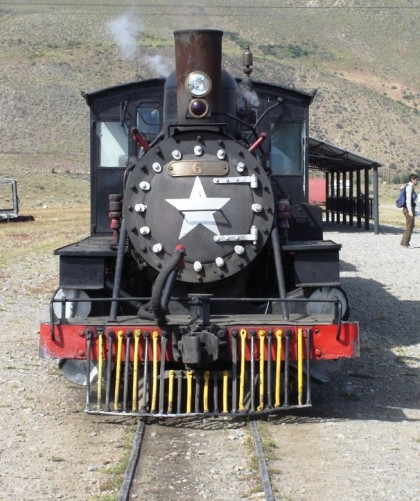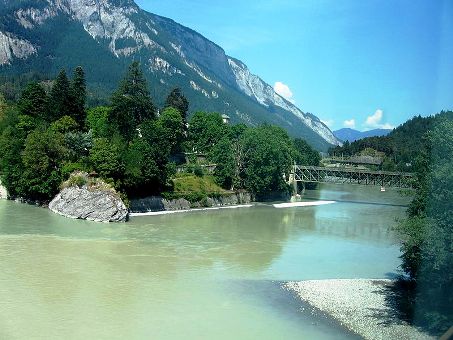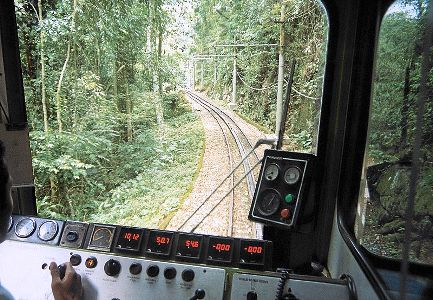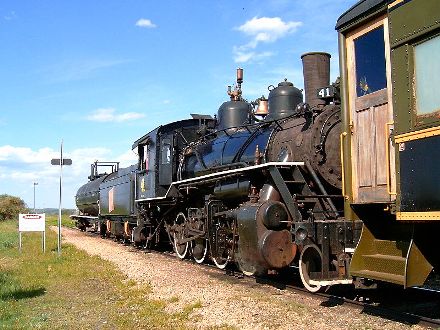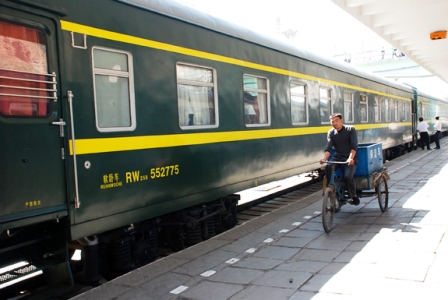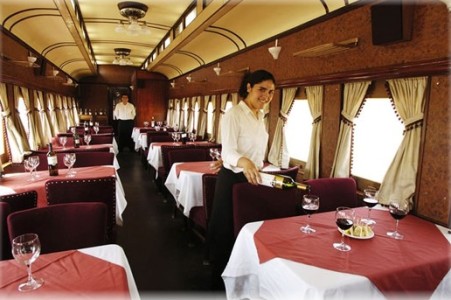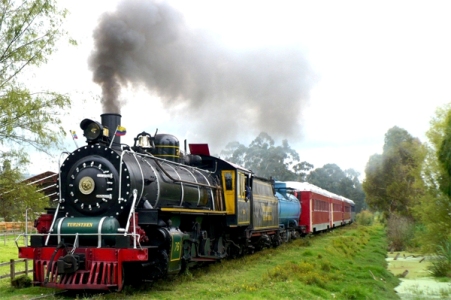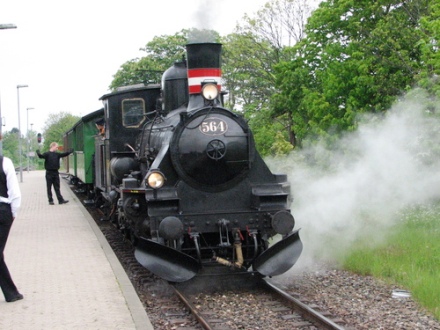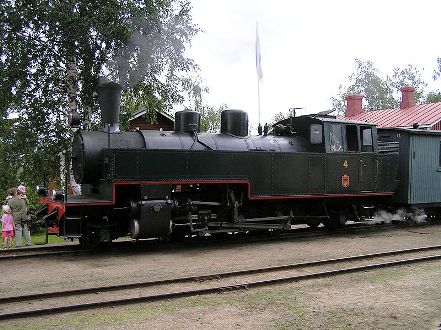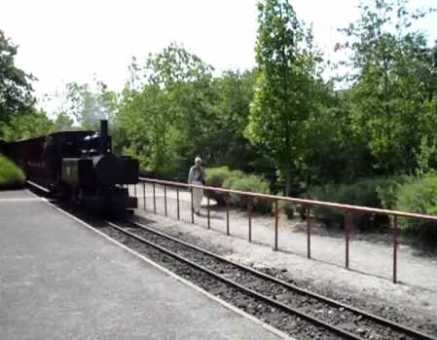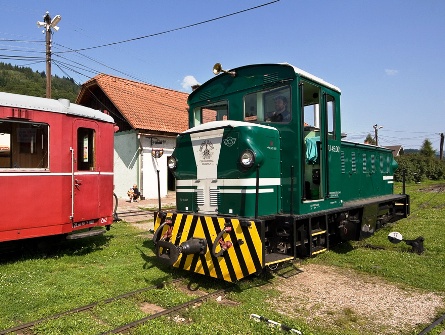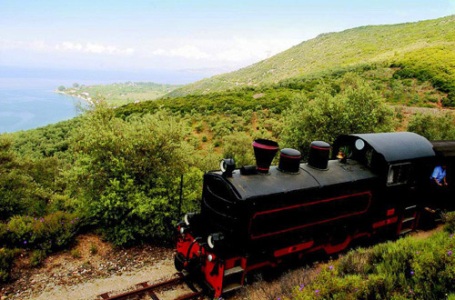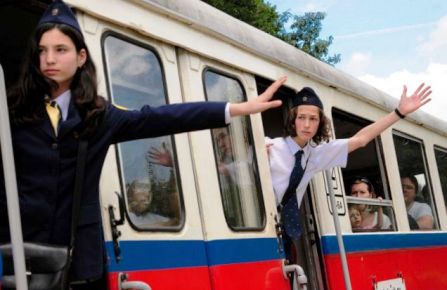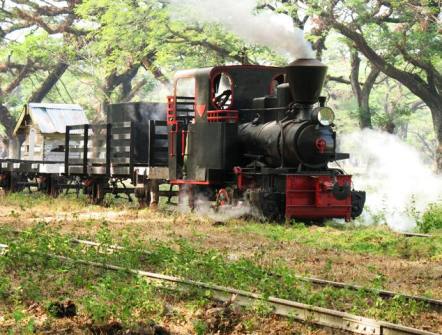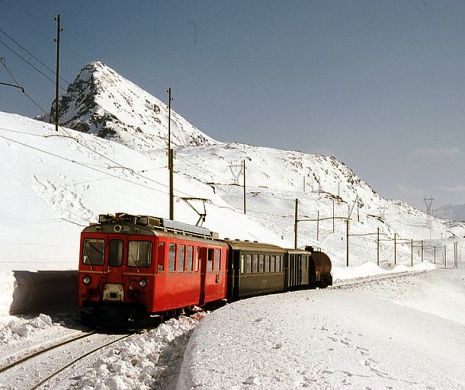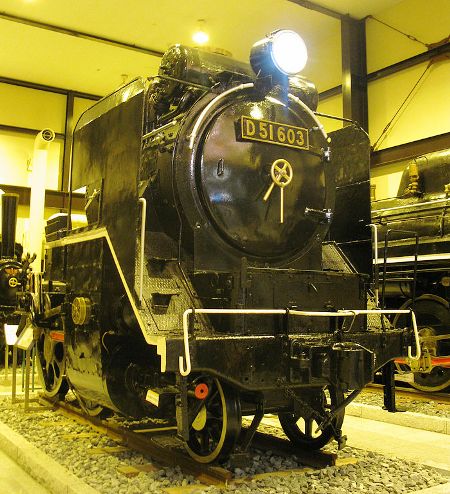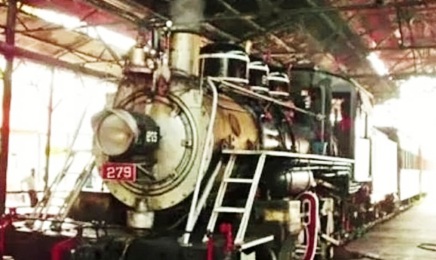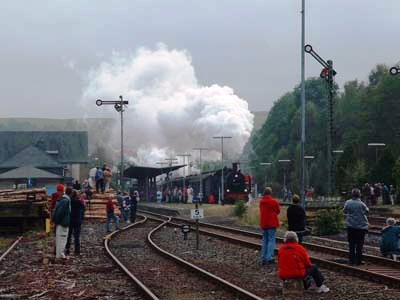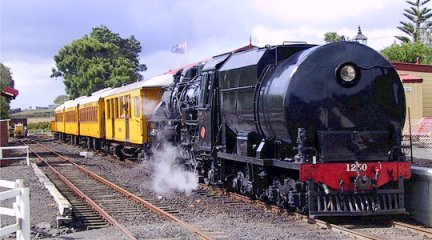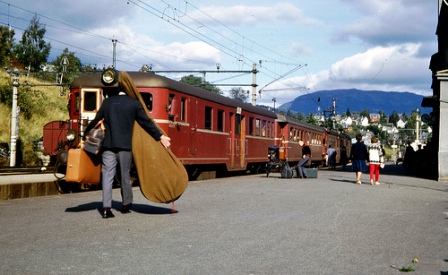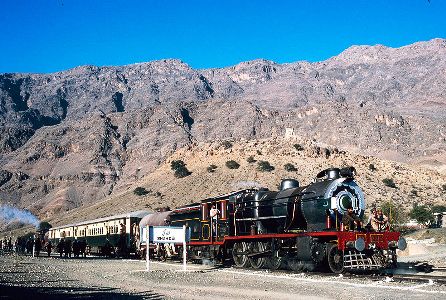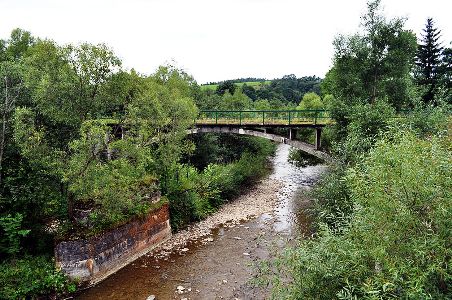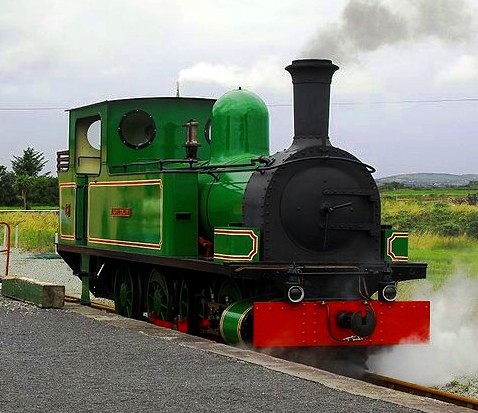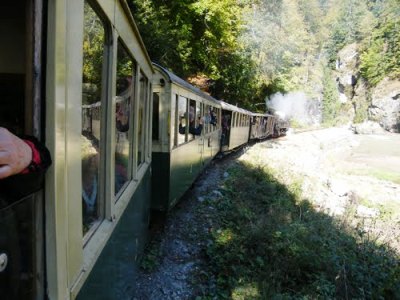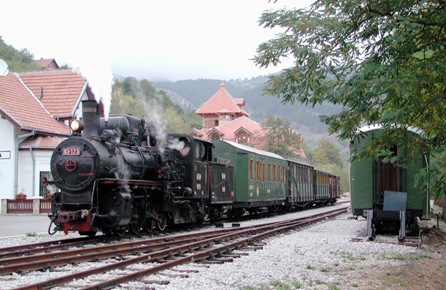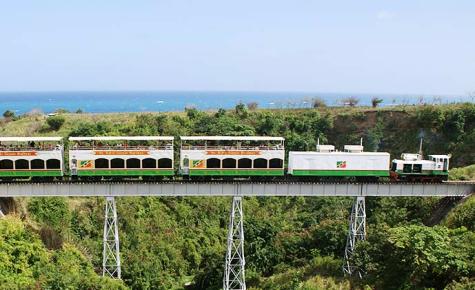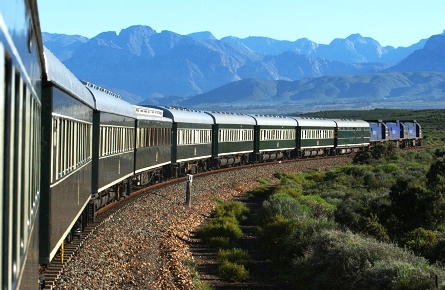 | « Back to article | Print this article |
30 STUNNING heritage trains of the world
It adds to a country's glamour quotient and draws tourists from across the world.
Such a rail is, at times, run by volunteers and often seeks to re-create scenes of the past.
Wikipedia recently came up with a list of Heritage Railways across the world.
We present in this slide show, 30 such railways from the pages of history.
Click NEXT to read about them. . .
1. India
India boasts of about four Heritage Railways.
These are:
- Darjeeling Himalayan Railway: Also known as the 'Toy Train', this is a 2 foot (610 mm) narrow gauge railway from New Jalpaiguri to Darjeeling run by the Indian Railways.
- Nilgiri Mountain Railway: This railway in Tamil Nadu was built by the British in 1908 and was initially operated by the Madras Railway.
This railway still runs its fleet of steam locomotives. - Matheran Hill Railway: Matheran Hill Railway is a heritage railway in Maharashtra. It was built between 1901 and 1907 by Abdul Hussein Adamjee Peerbhoy, financed by his father, Sir Adamjee Peerbhoy of the Adamjee Group.
The total construction was worth Rs 16 lakhs (Rs 1.6 million). - Kalka Shimla Railway: The Kalka–Shimla Railway is a 2 foot 6 inches (762 mm) narrow gauge railway near Delhi India travelling along a mostly mountainous route from Kalka to Shimla.
The history of Indian Railways dates back to the mid-nineteenth century.
In 1849, there was not a single kilometer of railway line in India.
By 1929, there were 41,000 miles of railway line serving every district in the country.
Click NEXT to know about heritage trains of other countries. . .
30 STUNNING heritage trains of the world
2. Old Patagonian Express, Patagonia, Argentina
This is a 750 mm (2 ft 5 1⁄2 in) narrow gauge railway in Patagonia, Argentina, that uses steam locomotives.
The train began its journey in 1935.
The first train to Esquel entered the city on May 25, 1945.
Until 1950, it was a freight-only service.
The first passenger service was launched in 1950 and connected Esquel with Buenos Aires.
Passengers would occupy loose wooden benches around a stove which could be used for light cooking and above all to prepare mate and keep warm.
Click NEXT to read further. . .
30 STUNNING heritage trains of the world
3. Dendermonde-Puurs Steam Railway, Belgium
This heritage railway situated in the Belgian provinces of East Flanders and Antwerp, runs from the town of Dendermonde to the town of Puurs over about 14 km.
The trains use both steam and diesel locomotives.
The railway has often been filmed.
The best known example of a film is Toto le Heros.
Click NEXT to read further. . .
30 STUNNING heritage trains of the world
4. The Glacier Express, Switzerland
This is an express train connecting railway stations of the two major mountain resorts of St. Moritz and Zermatt in the Swiss Alps.
The Glacier Express first ran in 1930.
The train provides a one-seat ride for a long duration travel.
In fact, it is often termed the slowest express train in the world.
Click NEXT to read further. . .
30 STUNNING heritage trains of the world
5. Corcovado Rack Railway, Brazil
This is a mountain railway in Brazil's Rio de Janeiro.
It runs from Cosme Velho to the summit of the Corcovado Mountain at an altitude of 710 metres (2,329 ft).
The summit is known for its statue of Christ the Redeemer and its views over the city and beaches of Rio.
Click NEXT to read further. . .
30 STUNNING heritage trains of the world
6. Alberta Prairie Railway Excursions, Canada
This is a heritage railway originating in Stettler, Alberta.
The train runs between Stettler and Big Valley.
The trips last five to six hours, with a stopover.
Click NEXT to read further. . .
30 STUNNING heritage trains of the world
7. Shangri-La Express, China
The private Shangri-La Express (formerly China Orient Express) is the best way to see China.
It is one of the most modern hotel trains in China.
The Shangri-La Express is modern, air-conditioned and has first-class sleeping compartments with two bunk-style twin beds.
Shangri-La Express tours include Tibet.
One can also avail of the day-long, 15-hour trip between Lhasa and Golmud.
The line reaches a height of 16,640 feet at the Tangula Pass.
Click NEXT to read further. . .
30 STUNNING heritage trains of the world
8. Colchaguac Wine Train aka Tren del Vino, Chile
A restored 1913 steam engine pulls the Tren del Vino.
An enjoyable way to get from Santiago to the rich vineyards of Colchagua Valley is aboard the antique rail cars of the Wine Train.
The all-day tour for $97 starts with a two-hour bus ride south from Santiago, then about two hours on a train with local wines to taste on board, followed by a tasting at a local winery, lunch at the dusty town of Santa Cruz and a visit to a museum of Chile's history.
Click NEXT to read further. . .
30 STUNNING heritage trains of the world
9. Tren Turistico De La Sabana, Bogota, Columbia
The Tren Turistico de la Sabana or Turistren runs heritage trains in Bogota, Colombia.
The company runs steam trains from Bogota (Sabana railway station) to Parque and Zipaquira.
These railway tours started with steam locomotives in 1993.
When the National Railways in Colombia stopped running trains in 1990, people with knowledge of the railway, started to renovate a steam locomotive and carriages for a tourist railway.
Click NEXT to read further. . .
30 STUNNING heritage trains of the world
10. Nordsjallands Veterantog (NSJV), Denmark
It was founded as Helsingor Jernbaneklub in 1958 as a model railway club.
NSJV has never owned its own tracks.
Instead, services are operated on regular railway tracks used by operators such as DSB and Lokalbanen.
Services run mostly in Northern Zealand, with scheduled services running on weekends and Wednesdays throughout the summer.
Click NEXT to read further. . .
30 STUNNING heritage trains of the world
11. Jokioinen Museum Railway, Finland
The museum was born on February 2, 1978.
The museum railway station at Humppila is beside the station of the Turku-Toijala VR line, providing a convenient access to the museum.
The Minkio station has a narrow gauge museum with a collection of carriages and locomotives.
Click NEXT to read further. . .
30 STUNNING heritage trains of the world
12. Froissy Dompierre Light Railway, France
The Froissy Dompierre Light Railway is a narrow-gauge light railway running from Froissy to Dompierre-Becquincourt, through Cappy, in the Somme department, France.
It is the last survivor of the 600 mm (1 ft 11 5⁄8 in) gauge trench railways of the World War I battlefields.
Click NEXT to read further. . .
30 STUNNING heritage trains of the world
13. Cierny Hron Railway, Slovakia
The Cierny Hron Railway is a narrow gauge railway in the Slovak Ore Mountains.
The planning for the railway began in 1898 and building began in 1908.
The railway was initially used as an industrial railway for logging operations.
Click NEXT to read further. . .
30 STUNNING heritage trains of the world
14. The Bergische Museumsbahn, Germany
This is a heritage tram museum situated in the German city of Wuppertal.
It operates its own tram line south of Wuppertal on original rails with original cars. Wuppertal still operates the 'Schwebebahn', an overhead railway.
Click NEXT to read further. . .
30 STUNNING heritage trains of the world
15. Pelion Mt. Scenic Railway, Greece
This charming steam train takes visitors on a beautiful journey across various Pelion villages that are inaccessable by any form of transport.
The steam train was the project of the Italian engineer, Evaristo De Kirico.
The first section of the railway was completed in 1895, after work began in late 1894. This first section joined the village of Lehonia with the port city of Volos.
Click NEXT to read further. . .
30 STUNNING heritage trains of the world
16. Children Railway, Hungary
The Children's Railway on the outskirts of Hungarian capital Budapest is almost entirely operated by youngsters -- the trains are pint-sized, the tracks are narrow, the speed is gentle.
The children work the switches and signals, print tickets and keep passengers informed as they putter along on the 11km (seven-mile) network.
The only job reserved for adults is actually driving the steam and diesel locomotives.
Children aged 10 to 14 control the traffic and commercial services provided but strictly according to regulations of any other railway line of the state railways of Hungary.
To join the team of operators, candidates must pass a series of exams.
The railway was built in 1948 by the communist authorities to give young people interested in a career in railways a chance to get hands-on experience.
Click NEXT to read further. . .
30 STUNNING heritage trains of the world
17. Cepu Forest Railway, Indonesia
Cepu Forest Railway is one of the four main centres of steam railway heritage remaining in Java.
The Cepu Forest Railway is a light logging railway of 1,067 mm (3 ft 6 in) gauge that runs through teak plantations to the northwest of the town of Cepu on the boundary between Central and East Java provinces.
The railway was originally constructed in 1915 and was fully operational by late 1990s.
Click NEXT to read further. . .
30 STUNNING heritage trains of the world
18. The Bernina Railway, Italy
This is a single track metre gauge railway line forming part of the Rhaetian Railway.
It links the spa resort of St. Moritz, in the Canton of Graubunden, Switzerland, with the town of Tirano, in the Province of Sondrio, Italy, via the Bernina Pass.
It ranks as the highest adhesion railway in the Alps with inclines of up to 7 per cent.
Click NEXT to read further. . .
30 STUNNING heritage trains of the world
19. Sagano Scenic Railway, Japan
The line uses once-abandoned tracks of the Sagano Line of JR West, from Torokko Sagano in Arashiyama, and passes a gorge offering a scenic view along the Hozu River, then enters and terminates in the basin of Kameoka.
It is closed on Wednesdays and in the winter.
The line was originally a part of the main line of Kyoto Railway, opened in 1899, to connect Kyoto to the northern part of Kyoto Prefecture, or the old province of Tamba. The company was nationalised in 1907.
Click NEXT to read further. . .
30 STUNNING heritage trains of the world
20. Ferrocarril Interoceanico, Mexico
The Interoceanic Railway of Mexico was one of the primary pre-nationalisation railways of Mexico.
Incorporated in Great Britain in 1888 to complete an unfinished project and compete with the Mexican Railway, it completed a narrow gauge main line from Mexico City to Veracruz in 1891.
Click NEXT to read further. . .
30 STUNNING heritage trains of the world
21. The Stoom Stichting Nederland, Netherlands
It is a railway museum in Rotterdam, Netherlands, founded in 1976.
The SSN owns a motive power depot which includes a locomotive shed, in which even major repairs can be carried out.
A turntable, platforms and locomotive facilities also form part of the site.
In the museum, the engine shed, a large collection of steam locomotives from Germany and the Netherlands may be viewed.
Click NEXT to read further. . .
30 STUNNING heritage trains of the world
22. The Glenbrook Vintage Railway, New Zealand
It is a steam railway in Glenbrook, New Zealand.
One of New Zealand's premiere rail heritage sites, it is not a museum as such, but rather a fully self-supporting, operating steam railway, built almost entirely by voluntary labour.
he GVR is based on part of the old Waiuku branch line which opened in 1922 and closed (to Waiuku) in 1967.
Click NEXT to read further. . .
30 STUNNING heritage trains of the world
23. Gamle Vossebanen aka The Old Voss Line, Norway
This is a heritage railway between Garnes and Midttun near Bergen, Norway.
Originally constructed as a narrow gauge line, it formed part of the Bergen to Voss railway opened in 1883.
Click NEXT to read further. . .
30 STUNNING heritage trains of the world
24. The Khyber Railway, Pakistan
The Khyber train safari in Khyber-Pakhtunkhwa province of Pakistan consists of a train pulled by two vintage steam locomotives built in 1920s.
The safari takes passengers through rugged mountainous terrain.
The train covers a total of 42 kilometres through 34 tunnels, 92 bridges and culverts.
The local population are still allowed a free ride on the train, in line with the agreement reached between them and the government during the British Raj.
Click NEXT to read further. . .
30 STUNNING heritage trains of the world
25. Bieszczadzka Forest Railway, Poland
Bieszczadzka Forest Railway is a narrow gauge railway built in a sparsely populated, forest region of Bieszczady Mountains.
Construction commenced at the end of 19th century and completed before the World War I.
Click NEXT to read further. . .
30 STUNNING heritage trains of the world
26. West Clare Railway, Republic of Ireland
The West Clare Railway originally operated in County Clare, Ireland between 1887 and 1961, and has partially re-opened.
This 3 foot (914 mm) gauge narrow gauge railway ran from the county town of Ennis, via numerous stopping-points along the West Clare coast to two termini, at Kilrush and Kilkee (the routes diverging at Moyasta Junction).
Click NEXT to read further. . .
30 STUNNING heritage trains of the world
27. Mocaniţa, Romania
It is a narrow gauge railway in Romania in Transylvania and nearby regions. They are run by steam-powered locomotives.
These railways were built for cargo and passenger services -- some in the era of the Austro-Hungarian Empire, before 1920.
Some are now being rehabilitated for the purposes of tourism.
Click NEXT to read further. . .
30 STUNNING heritage trains of the world
28. Sargan Eight, Serbia
This is a narrow-gauge railway line located amidst the gorgeous scenery of Mokra Gora on the slopes of three Serbian mountains -- Tara, Zlatibor and Sargan.
It is one of the most beautiful railways in the world.
The 300-metre ascent was skillfully designed by constructing an unusual loop in the form of the figure eight -- the popular 'Sargan Eight'.
Click NEXT to read further. . .
30 STUNNING heritage trains of the world
29. St Kitts' Scenic Railway, St Kitts
The 'Island Series' railcars of the St. Kitts Scenic Railway are double-decked, with an upper open-air observation platform.
Riding the rail cars, one can view the sugar cane and island vegetation for unobstructed 360 degree viewing, and a lower air-conditioned parlour.
Each passenger has a seat on both the top observation deck and in the air conditioned lower level 'parlour' of each railcar.
There is a service bar, a restroom, and paintings by local artists hang on the walls.
Click NEXT to read further. . .
30 STUNNING heritage trains of the world
30. Rovos Rail, South Africa
This is a private railway company operating out of Capital Park Station in Pretoria.
Named the Pride of Africa it is one of the world's top 25 trains because of its excellent accommodation, public spaces, service, dining and off-train sightseeing.
The company was started in 1989 by Rohan Vos and is still family owned.
The trains consist of restored South African coaches with two lounges, two restaurant cars, private sleeping compartments, each with private ensuite facilities.
Click NEXT to read further. . .

